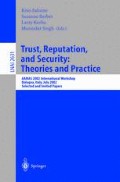Abstract
This paper introduces a multi-agent belief revision algorithm that utilizes knowledge about reliability or trustworthiness of information sources to evaluate incoming information and the sources providing that information. It also allows an agent to learn the trustworthiness of other agents using (1) dissimilarity measures (measures that show how much incorrect information from a particular information source) calculated from the proposed belief revision processes (Direct Trust Revision) and/or (2) communicated trust information from other agents (Recommended Trust Revision). A set of experiments are performed to validate and measure the performance of the proposed Trust Revision approaches. The performance (frequency response and correctness) of the proposed algorithm is analyzed in terms of delay time (the time required for the step response of an agent’s belief state to reach 50 percent of the ground truth value), maximum overshoot (the largest deviation of the belief value over the ground truth value during the transient state), and steady-state error (deviation of the belief value after the transient state). The results show a design trade off in better responsiveness to system configuration or environmental changes versus resilience to noise. An agent designer may either (1) select one of the Trust Revision algorithms proposed or (2) use both of them to achieve better performance at the cost of system resource such as computation power and communication bandwidth.
Access this chapter
Tax calculation will be finalised at checkout
Purchases are for personal use only
Preview
Unable to display preview. Download preview PDF.
References
Barber, K. S. and Kim, J. 2002, Belief Revision Process based on Trust: Agent Evaluating Reputation of Information Sources. In Trust in Cyber-societies: Integrating the Human and Artificial Perspectives, vol. 2246, Lecture Notes in Computer Science, Falcone, R., Singh, M., and Tan, Y.-H., Eds.: Springer, 73–82.
Corkill, D. D. and Lesser, V. R. 1983. The Use of Meta-Level Control for Coordination in a Distributed Problem Solving Network. In Proceedings of the Eighth International Joint Conference on Artificial Intelligence, Karl Sruhe, Germany: 748–756.
Gasser, L. 1992, Boundaries, Identity, and Aggregation: Plurity Issues in Multiagent Systems. In Decentralized A.I. 3: Proceedings of the Third European Workshop on Modelling Autonomous Agents in a Multi-Agent World, Kaiserslautern, Germany, August 5–7, 1991, Werner, E. and Demazeau, Y., Eds. Amsterdam: Elsevier Science, 199–213.
Gasser, L. 2001, MAS Infrastructure Definitions, Needs, Prospects. In Infrastructure for Agents, Multi-Agent Systems, and Scalable Multi-Agent Systems, Wagner, T. and Rana, O. F., Eds.: Springer-Verlag.
Hardin, R. 1993. The Street Level Epistemology of Trust. Politics and Society 21: 505–531.
Misztal, B. 1996. Trust in Modern Societies, Cambridge MA: Poloty Press.
Neapolitan, R. E. 1990. Probabilistic Reasoning in Expert Systems: Theory and Algorithms, New York: Wiley.
Nyquist, H. 1928. Certain Topics in Telegraph Transmission Theory. AIEE Transaction: 617–644.
Perl, J. 1988. Probabilistic Reasoning in Intelligent Systems: Network of Plausible Inference, San Mateo, CA: Morgan Kaufmann.
Rasmusson, L. and Janson, S. 1996. Simulated social control for secure Internet commerce. In Proceedings of the New Security Paradigms’ 96: ACM Press.
Shannon, C. E. 1949. Communication in the Presence of Noise. In Proceedings of the IRE: 10–12.
Author information
Authors and Affiliations
Editor information
Editors and Affiliations
Rights and permissions
Copyright information
© 2003 Springer-Verlag Berlin Heidelberg
About this paper
Cite this paper
Barber, K.S., Kim, J. (2003). Soft Security: Isolating Unreliable Agents from Society. In: Falcone, R., Barber, S., Korba, L., Singh, M. (eds) Trust, Reputation, and Security: Theories and Practice. TRUST 2002. Lecture Notes in Computer Science, vol 2631. Springer, Berlin, Heidelberg. https://doi.org/10.1007/3-540-36609-1_17
Download citation
DOI: https://doi.org/10.1007/3-540-36609-1_17
Published:
Publisher Name: Springer, Berlin, Heidelberg
Print ISBN: 978-3-540-00988-7
Online ISBN: 978-3-540-36609-6
eBook Packages: Springer Book Archive

